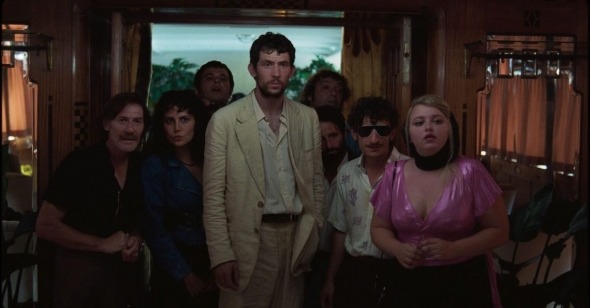In the Earth
By Adam Nayman
La Chimera
Dir. Alice Rohrwacher, Italy/France/Switzerland, NEON
There is nothing new under the sun in the films of Alice Rohrwacher, which pay their respects to the beauty and mystery of older civilizations while suggesting that exploitation—of people, and of physical and spiritual resources—is almost as ancient as the world itself. The fateful collision between tradition and modernity that marked the narratives of her first three features, Corpo Celeste (2011), The Wonders (2014), and Happy as Lazzaro (2017)—as well as her sublime, Oscar-nominated 2022 short film La Pupille—with its antifascist subtext, gets restaged once again in La Chimera. Her latest is set on the filmmaker’s home turf of Tuscany in the early 1980s and digs deeply into region’s social, political, and cultural history through a narrative centered on processes of excavation—specifically the efforts of a ragtag group of tombaroli (grave robbers) to locate a cache of long-buried Etruscan artifacts that could be worth millions on the open market, provided that they exist at all.
Introduced slouching half-conscious in a train compartment in a rumpled white suit, Arthur (Josh O’Connor) leverages his outsider status as an Englishman in Italy against his seemingly preternatural powers of detection; he’s accepted by the locals because, armed with a makeshift divining rod which he wields with just the right amount of low-key showmanship, he’s more often than not on the money about the right spots to start digging. Rohrwacher has cultivated magical realism in her stories before, most affectingly in the holy-fool mythos of Happy as Lazzaro, but here she smartly offers an even-handed ambiguity about whether Arthur is actually a savant or just frequently in the right place at the right time. She also doubles down on the air of mystery by giving him his own personal Holy Grail in the form of a lost lover, Beniamina, whose mother, Flora (a florid, lovable Isabella Rossellini), gives him sanctuary in between expeditions, as if his presence could somehow coax her missing daughter out of the ether.
In an interview with The Hollywood Reporter, Rohrwacher says she was inspired to write La Chimera during COVID when, for her, “death became a very strong presence.” The question of what exactly happened to Beniamina—and whether Arthur’s forays into various underground tombs are, on some level, quixotic attempts to find (or join?) her as much as to line his pockets—hovers around the edges of the shape-shifting frames. It stays hovering for a while: as shot on a variety of carefully textured celluloid formats by Hélène Louvart, La Chimera is never less than beautiful, but it does meander at times, especially in the first half. Said meandering is, part and parcel of Rohrwacher’s approach, with its slow accrual of glancing, lyrical exterior set-ups; she’s so determined to give her films a sense of place that she almost turns them into travelogues. But just as The Wonders and Happy as Lazzaro indulged in pastoral beauty in order to contextualize its fragility in the face of progress, La Chimera regards its molten seaside environs with a mix of reverence and melancholy, as a mute but eloquent witness to history and its spoils.
There is a sense in which Rohrwacher lays on the local color a bit thick—a little bit of carnivalesque whimsy goes a long way—and the flirtations between Arthur and the symbolically monikered Italia (Carol Duarte), who works in Flora’s household (and harbors secrets of her own), are more rote than they should be: they feel a bit like goldbricking, as if the filmmaker were too taken by her own surroundings and their layered strata of history and culture to worry about momentum. But once the film’s main plotline locks into place—and recenters the fertile theme of archaeology as a form of profiteering—it’s enough to effectively tether and ground the director’s airier impulses. After much scavenging for low-level trinkets—whose value, the film implies, lies only with those who buried them in the first place—the discovery of a particularly promising gravesite yields a discovery with mercenary potential. Once retrieved, the items on the docket not only concretize the mythic origins and ephemeral yearning of La Chimera’s title but also swiftly pressurize the narrative into a thriller—one in which Arthur is forced to examine, and perhaps try to recalibrate, his own demagnetized moral compass in the face of a voracious late-capitalist Moloch with cogs and tentacles everywhere, even middle-of-nowhere Italy.
If the switch from limpid, languorous ethnography to ticking-clock suspense is a bit jarring, it’s also satisfying to see Rohrwacher pull off a couple of scenes that seem to belong in a different movie, and with a significant assist from her most intimate collaborator. No spoilers, but a key villainous role has been cast with a wry sense of humor and filled out by what is basically a terrific extended-cameo performance. As for O’Connor, he’s got just the right rueful charisma for a guy who’s bought into a conception of himself as an antihero and can’t afford to change his stripes (or his suit) now. In a less sophisticated—and more strident—movie, Arthur would be a figure of bad faith, but Rohrwacher, who manages the tricky feat of being humane but not sanctimonious, refuses to exalt in staging his extended comeuppance. Instead, she understands—and acknowledges—the curiosity that compels him to stick his nose where it doesn’t belong, and that ultimately guides him toward a reckless but cathartic moment of liberation—a final plying of his trade that brings him within arm’s reach of the fulfillment he’s been seeking in every cave and crevice, and obliges him, at last, to reach out and grasp it.
